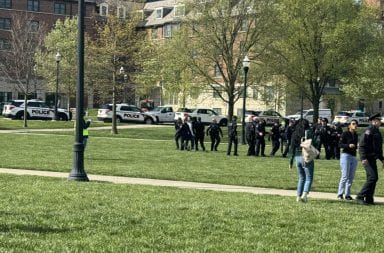Gravity wasn’t the only factor restricting the moonbuggy some Ohio State welding students built from taking off.
Students from the welding engineering program competed against 87 other teams in the Great Moonbuggy Race last weekend in Huntsville, Ala.
Students from high schools and colleges from 20 states participated along with international schools from Puerto Rico, Canada, India, Italy, Germany, Russia, Pakistan and the United Arab Emirates.
A moonbuggy is a two-person, one female and male, human-powered buggy with no electronics attached to it. The buggy must race through more than half a mile of rock, gravel, sand and other material that mimics the moon’s surface.
The event organized by NASA’s Marshall Space Flight Center has occurred for the past 19 years and requires students to construct their lunar roving vehicle and race against other teams.
Angela Storey, NASA spokeswoman, said this event was started to honor the history of the space program.
“The original race was done in conjunction with the 25th anniversary of Apollo as a commemorative idea,” Storey said.
She said that when this event first began in 1994, less than ten teams showed up. Each year since it has gained more recognition and interest.
Competitors raced their moonbuggies from about 7:30 a.m. to 5 p.m. both days but were only allowed to do it once. After completing their time trial Friday, they were able to rebuild anything that broke and test it again Saturday.
OSU’s team took third place last year and came back this year with a modified version of its previous vehicle. The team did not rank due to malfunctions with the buggy.
The team worked for about two months modifying its previous vehicle.
Jared Proegler, a third-year in welding engineering and managing team captain, participated in the event last year and this year.
“It was a very positive thing. Unfortunately we didn’t win and we didn’t place very well at all,” Proegler said. “It was a great learning experience and a great team building opportunity as well.”
The team’s moonbuggy did not meet the requirements for the specific dimensions, and the team was penalized. While racing, one of the bolts that held the wheels together sheared off, preventing the buggy from finishing the race.
Though they did not win, Diedra Williams, the project manager for the race, said participating in the event helped build their resume. They also had the opportunity to be recruited by sponsors from the aerospace industry such as Lockheed Martin Corp., The Boeing Co. and others.
“They can recruit possible summer interns, or co-op students or actual hires out of it,” Williams said. “It is an opportunity for the young people to be exposed to the very industry that they’re pursuing a degree in.”
Williams said the race was designed to give students the chance to work together on a long-term project and then see it in motion.
“It’s a team-building exercise,” Williams said. “It builds camaraderie … They learn that there is more than one approach to a problem and all team members have a voice.”
Proegler along with his other teammates, third-years Goran Lokas, Tim McGougan, Lori Bechie, Erik Birkinbine and Alex Ruff, and second-years Ben Harris, Kayla Luzadder, Colton Ritz and Isaac Kennedy, who are about to enter the welding program, all played a role in the race and said they are excited to do it again.
“We are ready to improve for next year and place,” Luzadder said. “It was great to see what other teams did for their buggy, and a lot of fun to watch the race.”
They plan to build two buggies next year and continue to build their team with new recruits interested in participating in the future.


